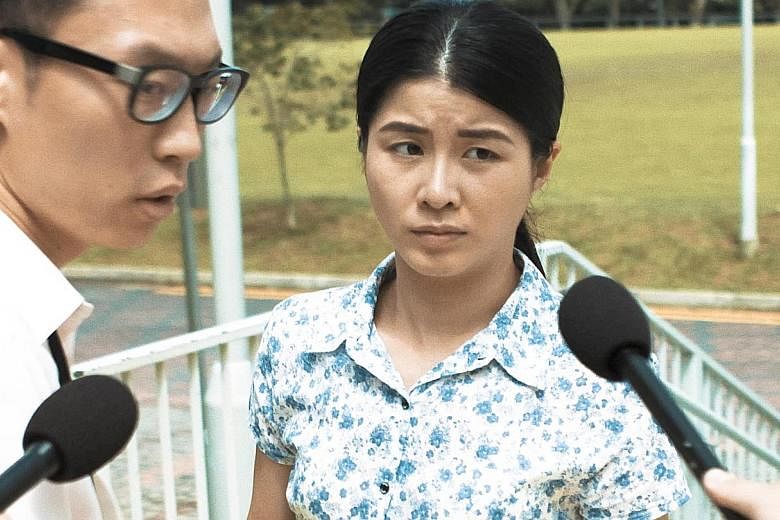The Singapore Writers Festival this year will feature an original, full-length film for the first time.
One Hour To Daylight (NC16, 75 minutes), a social drama partly inspired by the "curry dispute" that broke out here four years ago, opens with a Chinese woman scolding her Indian-Singaporean neighbours for cooking curry, a dish she deems unpleasant.
The film, shot partly around Housing Board blocks in Lengkok Bahru and Clementi, is part of the festival's Utter 2016 programme, which adapts Singapore literature into other mediums.
Instead of turning each text into one short film, as was done in the 2014 edition of the festival, Daylight's screenplay weaves into one full-length feature the works of four authors - Singapore Literature Prize nominee Jeremy Tiang, Chia Hwee Pheng, Siti Aisyah Mohamed Salim and Kanagalatha.
The job of filming each strand was split between four film-makers: Sufyan Sam'an, Jacky Lee, Jonathan Choo and D Vel Murugan.
Festival director Yeow Kai Chai says that a feature film "raises the challenge, raises the stakes".
-
BOOK IT / SINGAPORE WRITERS FESTIVAL: UTTER 2016
WHERE: Golden Village Suntec City, Hall 2
WHEN: Tuesday, 9pm, and Sept 25, 4pm
ADMISSION: $12
INFO: There will be a dialogue session with selected film-makers after each screening. Each ticket includes a film companion guide book and a graphic novel version of the movie from artist Dan Wong. Go to gv.com.sg for bookings
"It adds a new layer of adaptation. The festival wants to merge the art forms, to see how they echo each other," he says.
The festival's partner in the film is Sinema Media, a film consultancy. Its managing director and the film's creative producer, Mr Nicholas Chee, thought the plan was "a crazy endeavour", but one that he thought would spur the writing, directing and acting talent he assembled to new heights.
Mr Chee says the idea of a "common universe" for the four stories was inspired by Crash, the 2004 Oscar-winning movie which deals with how small acts born of private biases have wider consequences that cut across race and social class. He thought the curry incident, which is not mentioned in any of Daylight's source texts, fit the theme.
"The curry incident brought up unspoken, unaddressed issues and raised the discussion of xenophobia and racism," says Mr Chee, 38.
In 2011, a news article described how an Indian family was urged by official mediators to restrict their cooking of curry. Their neighbours, a family that just moved in from China, objected to the odour.
The report sparked online fury - much of it satirical and centred on food and protest dinner parties - but it also became a focal point for the resentment of newly arrived migrants over their perceived lack of appreciation for local customs.
In Daylight's version of Tiang's fiction piece Harmonious Residences, Mrs Chen is the China-born wife of a lift technician who has to pick up the pieces after he is killed in a freak accident.
In another thread, adapted from Chia's We'd Wanted To Rob A Bank, which was recently translated from Chinese to English, two men - one a Singaporean, another a Bangladeshi migrant worker - find themselves beset by comically trivial setbacks whenever they attempt a crime.
In the final scenes, the four strands come together.
The movie will screen on Tuesday and on Sept 25 at Golden Village Suntec City. Tickets go on sale today.
The project's main scriptwriter is Ms Tan Wei Ting, 25. Her job was to combine the draft screenplays, drawn up by co-writers tackling one source text each, into a single script. These were then translated into Chinese, Malay or Tamil as needed.
A prize-winning maker of short films herself, she says the hardest part of the job was staying true to each author's intent, while dealing with the ideas of the co-writer and the visual demands of cinema.
"The co-writers apply one layer of interpretation. By weaving them into one screenplay, I'm adding another layer. That's not very fair to the original story," she says.
The author of the source text had to win because the film was for a writers festival, she says.
Director and co-writer Sufyan helmed the thread adapted from the Malay-language story Per(anti) Mimpi 1.0, or Dream Device 1.0, adapted from a story by Siti Aisyah, who writes under the pen name Chempaka Aizim.
In the science fiction-tinged text, wealthy parents have to decide if their child is ready for a brain implant that will give her an advantage in school.
Freelance film-maker Sufyan, 31, who has worked with acclaimed director Royston Tan on various projects, says that he is glad to be working on a Malay story that is not set in the HDB heartland nor about youth in trouble.
"Stories about upper-middle- class Malays are not being told. This is a different kind of Malay family. The story is an eye-opener," he says.


